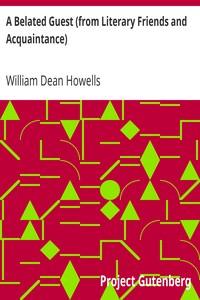Read this ebook for free! No credit card needed, absolutely nothing to pay.
Words: 8461 in 3 pages
This is an ebook sharing website. You can read the uploaded ebooks for free here. No credit cards needed, nothing to pay. If you want to own a digital copy of the ebook, or want to read offline with your favorite ebook-reader, then you can choose to buy and download the ebook.


: A Belated Guest (from Literary Friends and Acquaintance) by Howells William Dean - American literature 19th century History and criticism; Authors American 19th century Biography; Howells William Dean 1837-1920 Friends and associates
LITERARY FRIENDS AND ACQUAINTANCES--A Belated Guest
by William Dean Howells
A BELATED GUEST
It is doubtful whether the survivor of any order of things finds compensation in the privilege, however undisputed by his contemporaries, of recording his memories of it. This is, in the first two or three instances, a pleasure. It is sweet to sit down, in the shade or by the fire, and recall names, looks, and tones from the past; and if the Absences thus entreated to become Presences are those of famous people, they lend to the fond historian a little of their lustre, in which he basks for the time with an agreeable sense of celebrity. But another time comes, and comes very soon, when the pensive pleasure changes to the pain of duty, and the precious privilege converts itself into a grievous obligation. You are unable to choose your company among those immortal shades; if one, why not another, where all seem to have a right to such gleams of this 'dolce lome' as your reminiscences can shed upon them? Then they gather so rapidly, as the years pass, in these pale realms, that one, if one continues to survive, is in danger of wearing out such welcome, great or small, as met ones recollections in the first two or three instances, if one does one's duty by each. People begin to say, and not without reason, in a world so hurried and wearied as this: "Ah, here he is again with his recollections!" Well, but if the recollections by some magical good-fortune chance to concern such a contemporary of his as, say, Bret Harte, shall not he be partially justified, or at least excused?
My recollections of Bret Harte begin with the arrest, on the Atlantic shore, of that progress of his from the Pacific Slope, which, in the simple days of 1871, was like the progress of a prince, in the universal attention and interest which met and followed it. He was indeed a prince, a fairy prince in whom every lover of his novel and enchanting art felt a patriotic property, for his promise and performance in those earliest tales of 'The Luck of Roaring Camp', and 'Tennessee's Partner', and 'Maggles', and 'The Outcasts of Poker Flat', were the earnests of an American literature to come. If it is still to come, in great measure, that is not Harte's fault, for he kept on writing those stories, in one form or another, as long as he lived. He wrote them first and last in the spirit of Dickens, which no man of his time could quite help doing, but he wrote them from the life of Bret Harte, on the soil and in the air of the newest kind of new world, and their freshness took the soul of his fellow-countrymen not only with joy, but with pride such as the Europeans, who adored him much longer, could never know in him.
When the adventurous young editor who had proposed being his host for Cambridge and the Boston neighborhood, while Harte was still in San Francisco, and had not yet begun his princely progress eastward, read of the honors that attended his coming from point to point, his courage fell, as if he had perhaps, committed himself in too great an enterprise. Who was he, indeed, that he should think of making this
"Dear son of memory, great heir of fame,"
his guest, especially when he heard that in Chicago Harte failed of attending a banquet of honor because the givers of it had not sent a carriage to fetch him to it, as the alleged use was in San Francisco? Whether true or not, and it was probably not true in just that form, it must have been this rumor which determined his host to drive into Boston for him with the handsomest hack which the livery of Cambridge afforded, and not trust to the horse-car and the local expressman to get him and his baggage out, as he would have done with a less portentous guest. However it was, he instantly lost all fear when they met at the station, and Harte pressed forward with his cordial hand-clasp, as if he were not even a fairy prince, and with that voice and laugh which were surely the most winning in the world. He was then, as always, a child of extreme fashion as to his clothes and the cut of his beard, which he wore in a mustache and the drooping side-whiskers of the day, and his jovial physiognomy was as winning as his voice, with its straight nose and fascinating thrust of the under lip, its fine eyes, and good forehead, then thickly crowned with the black hair which grew early white, while his mustache remained dark the most enviable and consoling effect possible in the universal mortal necessity of either aging or dying. He was, as one could not help seeing, thickly pitted, but after the first glance one forgot this, so that a lady who met him for the first time could say to him, "Mr. Harte, aren't you afraid to go about in the cars so recklessly when there is this scare about smallpox?" "No, madam," he could answer in that rich note of his, with an irony touched by pseudo-pathos, "I bear a charmed life."
The drive out from Boston was not too long for getting on terms of personal friendship with the family which just filled the hack, the two boys intensely interested in the novelties of a New England city and suburb, and the father and mother continually exchanging admiration of such aspects of nature as presented themselves in the leafless sidewalk trees, and patches of park and lawn. They found everything so fine, so refined, after the gigantic coarseness of California, where the natural forms were so vast that one could not get on companionable terms with them. Their host heard them without misgiving for the world of romance which Harte had built up among those huge forms, and with a subtle perception that this was no excursion of theirs to the East, but a lifelong exodus from the exile which he presently understood they must always have felt California to be. It is different now, when people are every day being born in California, and must begin to feel it home from the first breath, but it is notable that none of the Californians of that great early day have gone back to live amid the scenes which inspired and prospered them.
Before they came in sight of the editor's humble roof he had mocked himself to his guest for his trepidations, and Harte with burlesque magnanimity had consented to be for that occasion only something less formidable than he had loomed afar. He accepted with joy the theory of passing a week in the home of virtuous poverty, and the week began as delightfully as it went on. From first to last Cambridge amused him as much as it charmed him by that air of academic distinction which was stranger to him even than the refined trees and grass. It has already been told how, after a list of the local celebrities had been recited to him, he said, "why, you couldn't stand on your front porch and fire off your revolver without bringing down a two volumer," and no doubt the pleasure he had in it was the effect of its contrast with the wild California he had known, and perhaps, when he had not altogether known it, had invented.
Cambridge began very promptly to show him those hospitalities which he could value, and continued the fable of his fairy princeliness in the curiosity of those humbler admirers who could not hope to be his hosts or his fellow-guests at dinner or luncheon. Pretty presences in the tie-backs of the period were seen to flit before the home of virtuous poverty, hungering for any chance sight of him which his outgoings or incomings might give. The chances were better with the outgoings than with the incomings, for these were apt to be so hurried, in the final result of his constitutional delays, as to have the rapidity of the homing pigeon's flight, and to afford hardly a glimpse to the quickest eye. It cannot harm him, or any one now, to own that Harte was nearly always late for those luncheons and dinners which he was always going out to, and it needed the anxieties and energies of both families to get him into his clothes, and then into the carriage where a good deal of final buttoning must have been done, in order that he might not arrive so very late. He was the only one concerned who was quite unconcerned; his patience with his delays was inexhaustible; he arrived at the expected houses smiling, serenely jovial, radiating a bland gaiety from his whole person, and ready to ignore any discomfort he might have occasioned.
Of course, people were glad to have him on his own terms, and it may be truly said that it was worth while to have him on any terms. There never was a more charming companion, an easier or more delightful guest.
Free books android app tbrJar TBR JAR Read Free books online gutenberg
More posts by @FreeBooks

: Some Anomalies of the Short Story (from Literature and Life) by Howells William Dean - Essays; Literature


: Spanish Prisoners of War (from Literature and Life) by Howells William Dean - Spanish-American War 1898 Personal narratives






